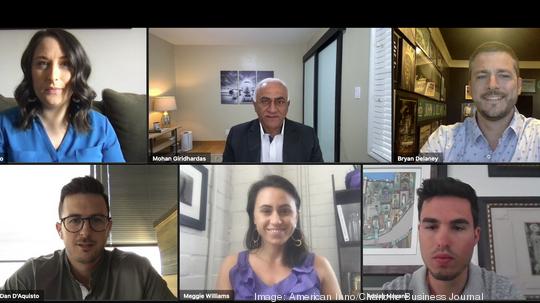
Charlotte Inno kicked off its 2021 virtual event series on Thursday with State of Innovation: Adapting to Business Changes.
The hour-long panel discussion focused on the challenging road startups have had to navigate over the last 12 months and what it took to overcome those obstacles to begin to thrive again. If you missed the live event, check out the recording here.
The panel featured Dan D'Aquisto, co-founder of 2ULaundry and LaundroLab; Mohan Giridharadas, founder and CEO of LeanTaaS; Adrian Mayans, co-founder of Lucid Drone Technologies; and Meggie Williams, founder and CEO of Skiptown. Those four local founders made significant pivots and operational changes to keep their startups thriving over the last 12 months.
Below are a few key takeaways from Thursday's conversation.
How were you impacted by the pandemic, and how different did your day-to-day operations look in February 2020, compared to today?
D'Aquisto: We had just closed our Series A in Oct. 2019 with plans to aggressively expand across the Southeast. We doubled our service area in Atlanta and launched our third market in Raleigh in January of 2020. I remember, March 15, our pickups dropped off considerably across all three markets, and we made the quick decision to kind of take a step back ... We pulled our service operations out of Atlanta and Raleigh completely. Our consumer behavior changed overnight. It's picked back up to pre-Covid levels and beyond, as of this month, which is exciting. We're still only operating in Charlotte right now, so we went from 30-40 salaried employees to about 20.
Williams: At the time, we were a dog-walking company, predominately. We were gearing up to pivot to the Skiptown model later that year. We were doing about 230 visits per day, so about a million-dollar run rate, and in the span of a week, we saw about 90% of our revenue disappear. We had to make some pretty hard decisions; we reduced the team by more than 90%, everybody took salary reductions. It was a really tough couple months as we were really trying to hone in on critical path work and gearing ourselves toward launching Skiptown, which we had already invested in as being the future.
Giridharadas: Our initial impression at the start of Covid was, health systems were feeling pinched financially. We had three products at the time ... We made the difficult decision to put our clinics product on pause ... That ended up creating momentum for us to launch a new product on patient beds, which is now controlling about 2,000 beds in 30 hospitals.
How did the need to pivot influence your overall business model and focus moving forward?
Giridharadas: For us, the newest thing was the way we deployed our software. We would spend maybe three or four weeks onsite, three or four days a week. When we entered the pandemic, health systems weren't letting family be by the bedside of patients, so they certainly didn't want outsiders inside the system. We pivoted very quickly to be able to deploy our products remotely. Novant, right here in Charlotte, was a shining example for us. We went live with our operating rooms product in a six-week period, 20 facilities, 120 operating rooms, and no one from our team set foot on Novant property even once. We continue to deploy remotely; we haven't visited a customer site in 12 months.
Mayans: At the end of the day, our business model wasn't really impacted. We still lease drones to third-party contractors. We looked into potentially service providing, realized the reason people slowed down on the cleaning side wasn't only the service providers, it was the brick-and-mortar locations no longer needed cleaning. So for us, the big thing was opening a new product line significantly sooner than we'd anticipated.
What long-term impact did Covid have on your startup's mission?
Williams: It validated the product market fit that we have. In the middle of the pandemic, we're trying to open a bar; we're trying to open pet care services that rely on people mostly being out of the home, and the month before we opened we sold more than 800 memberships. For me, that was the first real sign that we had strong market fit, and even the middle of a global pandemic people care about their dogs, are going to make sure their dogs are healthy and happy, and they're going to invest in their pets.
D'Aquisto: Our mission is to be one of the first nationally recognized brands in laundry and dry cleaning in a service-based space. That mission hasn't changed, and it won't change, but the means to get there has. We always had plans to expand, and expansion pre-Covid was aggressively doing so with our pickup and delivery business model ... That path was definitely expected to raise significant amounts of venture capital to do so. Our path now is still very focused on expanding, but we've uncovered a different way to do that, by way of franchising. It has a more challenging approach, but allows the main, core investors — our founders and employees — to continue to hold a larger stake on the equity side, which ultimately fuels motivation.
View the full event below.



